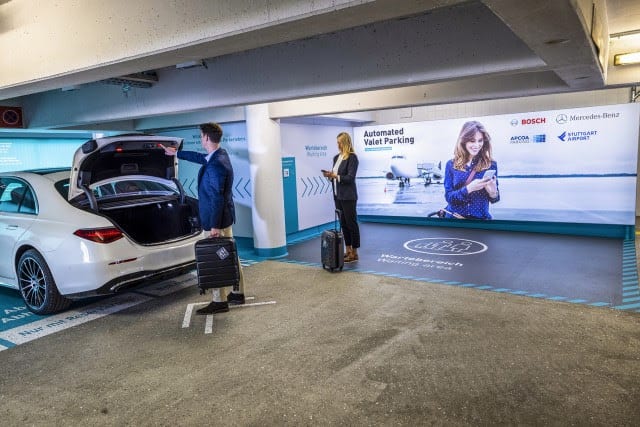Bosch and Mercedes-Benz have teamed with garage operator Apcoa to test out a new automated driverless valet parking at Stuttgart airport.
The new automated valet parking system co-developed by Bosch and Mercedes is being tested in two parking spaces at the P6 parking garage at Stuttgart airport, with a view to making ready for commercial operation on a wider scale in due course. The trio said they will test the relevant vehicle tech and garage IoT infrastructure at the site, including SAE Level 4 automated driving, the second-highest level of automation.
Bosch and Mercedes received a permit to operate the automated parking system with selected E-Class vehicles in July last year. The new Mercedes-Benz S-Class is the first production vehicle to be made available with the relevant SAE Level 4 ‘park pilot’ application, to enable the car to park itself, on command — provided the trial works, parking garages are equipped with the right infrastructure, and national legislators green-light the concept.
For the trial, a drop-off and pick-up area will be set up directly behind the entrance to the P6 parking garage; the idea is their vehicles will park in the basement, guided by information from the infrastructure technology, which features video cameras to identify vacant parking spaces, monitor the driving aisle, and detect obstacles in the aisle. Lidar sensors have previously been used for this purpose.
A dedicated control centre in the parking garage calculates the route the vehicles need to take to reach an available space. Cars will be able to drive around the parking garage, to move between different stories. The in-vehicle technology converts information from the infrastructure into driving manoeuvres. If the cameras detect an unexpected obstacle, for example, the vehicle will be directed to perform an emergency stop.
Apcoa is providing the digital platform and smartphone app, APCOA FLOW, to enable parking reservations, vehicle identification, contactless entry and exit, automated payments and invoicing, and sundry communication about dropoffs and collections.
Apcoa, Europe’s largest parking garage operator, manages around 1.5 million individual parking spaces at over 9,500 locations in 13 countries. It reckons its venues could accommodate 20 percent more vehicles, with automated ballet parking.
In August, Bosch announced a deal with Ford in the US to combine with property developer Bedrock on a similar demonstration project in Detroit, Michigan, enabling vehicles drive and park themselves in an enclosed garage. The project, at Bedrock’s Assembly Garage in Detroit, is billed as the first “infrastructure-based [sensor-based] solution” for automated parking in the US.
The Assembly is a 160,000 square-foot (15,000 square-metre) office, retail, and residential site in the downtown Corktown district in Detroit, with 50 below-ground parking spaces. The trio said the automated valet parking solution will increase parking capacity at the site. Additional services will be offered for parked vehicles, they said. The project will use (Escape model) test vehicles from Ford and ‘smart’ sensor and communications infrastructure from Bosch.

